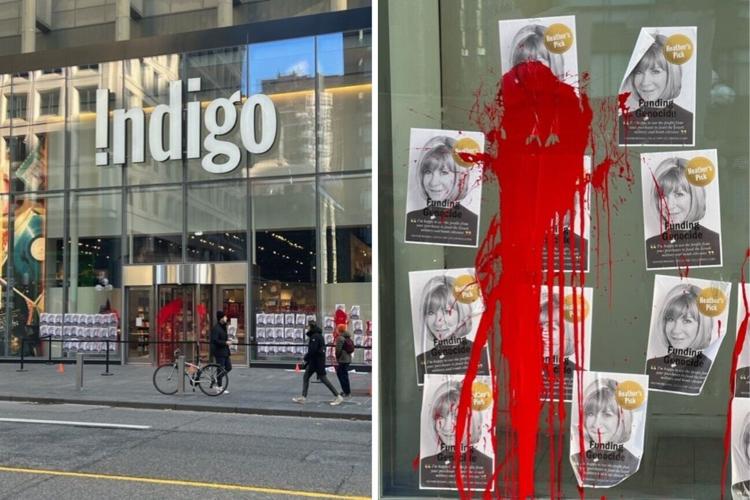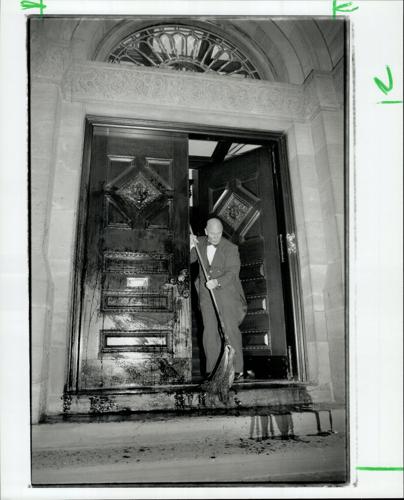Under the cover of darkness, a group gathered in downtown Toronto with posters, paint and a plan.
The pro-Palestinian activists were there to make a splash — something that would visibly link an iconic Canadian business to the killing of thousands of civilians in the Gaza Strip.
They had picked a target long linked to support of Israel: Indigo and its CEO, Heather Reisman.
They glued dozens of posters, which included a mock-up of Reisman's "Heather's Pick" seal, then splattered red paint in a way that would make it look like copious amounts of blood.
Then they fled into the night.
The reaction was swift and widespread, with TV cameras set up on the sidewalk the next morning and police evidence cones littering the pavement.
This was no typical act of vandalism, and it would not be treated that way.
Three days later, the first alleged perpetrator was arrested. Eight days after that, 10 more arrests were made.
You might be interested in
All had been charged with conspiracy and mischief.
But a week later, another charge was laid, not for mischief, but for criminal harassment, something that could lead to as long as 10 years in prison.
Protests erupted at York University — where three of the accused had been suspended — and their supporters wanted them reinstated.
Their court dates will begin this week, and 11 people, many of them well-known activists and educators, students and professors, now face serious jail time for a non-violent crime typically carried out by teenagers.
This raises the question of whether the weight of the legal penalties they're now facing are proportional to what they are alleged to have done.
It depends what you see in that paint on the store window.
Michael Bueckert, an academic who studies international solidarity movements in Canada, says that the pro-Palestinian protests that have repeatedly taken over the streets of Toronto over the past months are modelled on the legacy of the South African anti-apartheid movement, in which Toronto activists also played a leading role.
"The actions taken by protesters in the Palestine solidarity movement, including boycotts targeting complicity in what Israel is doing … are a long-standing, tried and true form of campaign,” said Bueckert, who is also the vice-president of the pro-Palestinian Canadians for Justice and Peace in the Middle East.
While both the anti-apartheid and Boycott, Divestment and Sanctions (BDS) movements have faced widespread condemnation for their controversial tactics — and many would reject any comparisons — Bueckert says the severe legal repercussions are new. In his view, they have been excessive.
“The extreme police response vis-à-vis the Indigo protesters seems to indicate a particular hostility and intolerance for these methods when they are done in support of Palestinian human rights,” he said. “This sends a message that Palestinians do not have a right to advocate for themselves, and that they are not deserving of justice and freedom.”
Bueckert points to an incident in 1990 where anti-apartheid activists sprayed chicken blood on the door of the Toronto Club where a South African chief was speaking. No charges were laid, according to a search of news reports.
Many disagree that both incidents qualify as legitimate civil disobedience.
While one targeted an actual South African official, the other focused on a Canadian citizen with no direct role in the current conflict in the Middle East. In addition to splattering paint at Indigo, the perpetrators also plastered the store with the CEO’s headshot overlaid with text accusing her of "funding genocide."

A counter-demonstrator carries an Israeli flag as protesters gather outside an Indigo store in Toronto on Nov. 30. The demonstration, organized by the group Jews Say No to Genocide, was partly in response to arrests made after the store was vandalized.
Chris Young/The Canadian Press file photoFor some, especially in the Jewish community, the targeting of the Indigo founder Reisman crossed the line from criticism of Israel into antisemitism.
"It's absolutely outrageous that anybody would think there was anything legitimate about this,” said Jaime Kirzner-Roberts, vice-president of the GTA branch of the Centre for Israel and Jewish Affairs, a group Reisman has been credited with helping to create.
"This is a business owner who’s having her business vandalized because she's a Jew. People can tie themselves in knots to explain why that is OK. But it’s not OK. It’s not morally OK. And it’s also not legal."
Kirzner-Roberts said this was no misdemeanour mischief, because it targeted a Jewish business owner for supporting an Israeli charity, something that would apply to many Jews.
"If Heather Reisman is fair game. I’m fair game, and so is every single Jew that I know," she said.
Kirzner-Roberts said the fact that some of the alleged perpetrators are educators, responsible for imparting information and moral lessons, reveals the real face of antisemitism in Toronto.
“I don’t care how many sociology degrees these people have,” she said.
"I don’t care how much they think they’re above the law. The law applies to all of us.”
Of the 11 arrested, four instruct or study at York University, one lectures at University of Waterloo and two others are current or former teachers at the Toronto District School Board (TDSB).
Lesley Wood, 56, is an associate professor in the department of sociology at York. Sharmeen Khan, 45, is a union staff member at York. Nisha Toomey, 41, has a PhD from the Ontario Institute for Studies in Education at University of Toronto and is a post-doctoral visitor at York, according to her website. Stuart Schussler, 39, is a doctoral student at York, according to his website.
Karl Gardner, 33, is a lecturer at University of Waterloo, where he teaches Social Inequality, Social Justice and Social Action.
Ian Doty, 43, is an elementary and middle school music teacher currently employed by the Toronto District School Board (TDSB). Suzanne Narain, 38, is a former primary school teacher at the TDSB.
Also charged are Mercedes Lee, 44, Sarom Rho, 29, MacDonald Scott, 56, and Clement Cheng, 26.
While it is widely accepted that speech that conflates Jews with Israel or claims Jews are responsible for Israel's actions is antisemitic, parsing the meaning or intent of the Indigo vandalism is complicated by the direct financial support Reisman has provided to Israeli soldiers via her charity.
The HESEG Foundation, founded by Reisman and her husband, Gerry Schwartz, awards scholarships to discharged Israeli Defense Forces "lone soldiers" — military volunteers, including those from outside Israel, who do not have immediate family in the country to provide support.
The foundation's website states the couple's contribution "stems from a deep sense of commitment to the State of Israel and from a desire to maintain its resilience and cultivate its educational values."
According to the Canada Revenue Agency, the HESEG Foundation is a registered charity, with Reisman and Schwartz both listed as directors. The organization operates out of Canada and Israel, according to CRA filings reviewed by the Star, and the charity spent nearly $7 million on charitable programs between 2021 and 2022.
"The discharged lone soldiers who sacrificed so much for the State of Israel are the volunteers among volunteers, the real pioneers of the 2000s," Reisman and Schwartz state on the foundation’s website. "We at HESEG salute them and reach out to them so they can remain in Israel, acquire an academic education, continue to strive for excellence, and lead the State of Israel to future achievements."
The foundation and Reisman have declined the Star's repeated requests for comment.
In 2017, according to data provided by the Israeli Defense Forces (IDF) and Lone Soldier Centre in Israel, there were 7,000 lone soldiers in the Israeli military, and 230 were Canadian.
Critics of Israel, including some Jewish groups that publicly support the Palestinian movement, have argued the Indigo vandalism was not motivated by antisemitism, but rather disapproval over the HESEG Foundation’s support of IDF volunteers.
"Fighting for a free Palestine is not antisemitism," said Sarena Sairan, executive director of the United Jewish People's Order, at a news conference in December, outside the same Indigo bookstore that was vandalized. "We are not self-hating Jews. We know that anti-Zionism is not antisemitism and silencing and criminalizing activists does not make Jews safe."
Those who voiced their support for the arrestees include more than 600 academics from the United States and Canada, who signed a letter of support, and the prominent Canadian author and social activist Naomi Klein, who called for all charges to be dropped.
But in a city that's experienced a marked increase in hate-crimes since the Israel-Hamas war began, there are those who see a line from acts such as vandalism at a storefront to the threat of antisemitic violence.
Avia Pasternak, a professor of political philosophy at the University of Toronto Scarborough, said she doesn't believe the activists' apparent goals — drawing attention to Reisman's support of the Israeli military — justify the resulting harm, which goes beyond the financial damage to the store.
Indigo's glass façade was targeted on the anniversary of Kristallnacht — the "Night of Broken Glass" — when Jewish-owned stores were systemically smashed and burned across Nazi Germany in 1938.
"Targeting a Jewish-owned shop in this way was very likely to bring back very difficult memories for members of the Jewish community, to increase the sense of fear and anxiety amongst this already vulnerable minority and may contribute to a further rise in antisemitic attacks," said Pasternak. "These were entirely foreseeable results of the Indigo vandalism, even if the activists did not intend them. They weigh heavily against their decision to perform it."
There are some who feel it was not just a hateful act, but one that demands severe punishment.
At a meeting attended by the Star in early December with members of North York's Jewish community, Coun. James Pasternak (Ward 6, York Centre, no relation to the professor) and representatives from Toronto police's hate-crime unit, the Indigo 11 were spoken of by attendees in the same breath as the people responsible for a bomb threat to a Toronto Jewish school and for shooting at a Montreal Jewish school last month.
"They need to have their lives ruined," said one woman at the meeting.

Faculty, staff and students at York University walk out of class Nov. 28,to protest arrestees in the Indigo incident who were put on leave.
Chris Young/The Canadian Press file photoThe 11 accused are not able to meet now because of a non-association order handed down by the court, the Star was told by an activist acting as a spokesperson. None of them returned individual requests for comment. Wood, who is Jewish, previously released a statement in which she, without admitting culpability, denied that any antisemitism is inherent in the vandalism.
Wood is one of three people connected with York University who were put on "non-disciplinary" leave in the wake of the arrests — a decision that has sparked two separate protests from supporters of the 11.
York has said it placed them on leave "out of concern for the safety of our community."
Some members of the university community expressed support for the administration's decision to place the three people connected with York on leave.
"The administration is doing exactly what it said it would do, which is not tolerating behaviour that is not acceptable," said Dean Lavi, director of Hillel York, a Jewish campus organization to which the Gerald Schwartz & Heather Reisman Foundation has been a significant donor.
"If they're teaching students and young adults how to behave, then they need to show a level of professionalism in their life," he continued. "Committing an act of vandalism, if that is what they did, is illegal, and someone who did something illegal should not be teaching students."
Employment and human rights lawyer Yusuf Buttar, however, believes the university might have acted unfairly.
"What were they privy to that was the impetus for them to take this drastic measure?" he said. "We’re dealing with a high-profile case here, a lot of moving variable parts here. But you can’t unilaterally remove someone from employment. There has to be a basis."
Of particular interest in the Indigo case was the addition of criminal harassment charges a week after the bulk of the arrests. It's a novel application of the charge, legal experts say, and one that could set a precedent if proven in court.
Jacob Roth, associate counsel at Robichaud's Criminal Defence Litigation in Toronto, said he has never seen "this sort of conduct" be prosecuted under criminal harassment — and he said he's taken on a lot of harassment cases.
"I could see an argument that expanding the doctrine of criminal harassment to extend to protest activities could have a chilling effect on free expression."
Reid Rusonik, a criminal defence lawyer and managing partner of Rusonik, O’Connor, Robbins, Ross & Angelini, LLP, told the Star in November it is standard practice for police to execute no-knock warrants in the early morning, which he said police believe is safer than other times of day.
Roth, for his part, said he hasn't seen police break down doors or take people from their beds in connection with a mischief or criminal harassment investigation. Usually, he said, police will call suspects and ask them to come down to the station.
The harassment charge means the activists are accused of personally targeting Reisman via their action at Indigo, Roth said, prompting a "reasonable" fear for her safety.
He said he doesn't personally think the Crown will move forward with the hate-motivation attribute to the mischief charge. Hate-motivated mischief is usually reserved for crimes involving places of worship or cultural centres for identifiable groups, which Indigo is not.
Notably, because Reisman is the only person named as a victim by police, she could be compelled to take the stand if the case goes to trial, Roth said.
Others, meanwhile, have lauded the authorities' actions.
In the words of the CIJA’s Kirzner-Roberts: "We're very grateful here in Toronto to see that our police are giving the signal that we all have a right to our opinion, we all have a right to demonstrate, we all have a right to take a political position. But we don't have a right to vandalize people's property and to terrify people based on their race or social background."
Ultimately, whatever plays out in the courtroom — whether charges are dropped or prison sentences are handed down — it will have an outsized impact for many people in Toronto on both sides of the issue.
Update — Jan. 8, 2024: This story has been updated with additional context as well as to correct the spelling of the surname of one of the accused, Karl Gardner.




















